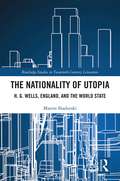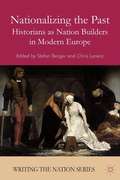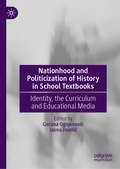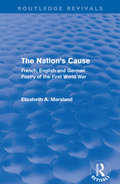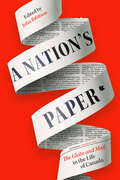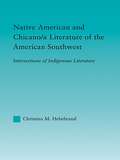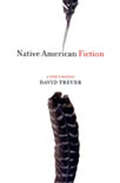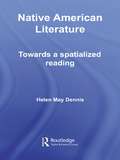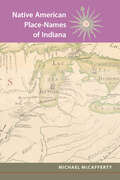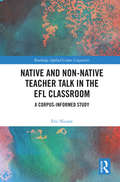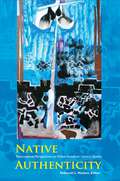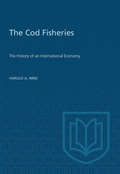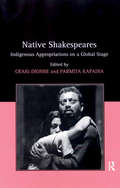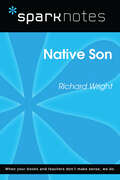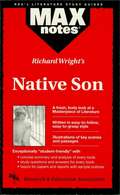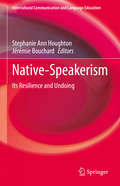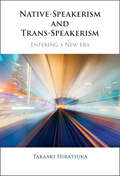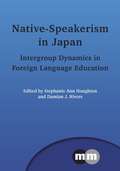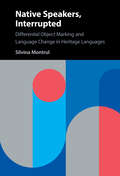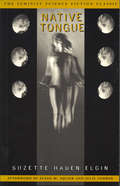- Table View
- List View
The Nationality of Utopia: H. G. Wells, England, and the World State (Routledge Studies in Twentieth-Century Literature)
by Maxim ShadurskiSince its generic inception in 1516, utopia has produced visions of alterity which renegotiate, subvert, and transcend existing places. Early in the twentieth century, H. G. Wells linked utopia to the World State, whose post-national, post-Westphalian emergence he predicated on English national discourse. This critical study examines how the discursive representations of England’s geography, continuity, and character become foundational to the Wellsian utopia and elicit competing response from Wells’s contemporaries, particularly Robert Hugh Benson and Aldous Huxley, with further ramifications throughout the twentieth century. Contextualized alongside modern theories of nationalism and utopia, as well as read jointly with contemporary projections of England as place, reactions to Wells demonstrate a shift from disavowal to retrieval of England, on the one hand, and from endorsement to rejection of the World State, on the other. Following Huxley’s attempts to salvage the residual traces of English culture from their abuses in the World State, England’s dissolution in the throes of alterity takes increasing precedence over the visions of a post-national world order and dissents from the Wellsian utopia. This trend continues in the work of George Orwell, Anthony Burgess, J. G. Ballard, and Julian Barnes, whose future scenarios warn against a world without England. The Nationality of Utopia investigates utopia’s capacity to deconstruct and redeploy national discourse in ways that surpass fear and nostalgia.
Nationalizing the Past
by Stefan Berger Chris LorenzHistorians traditionally claim to be myth-breakers, but national history since the nineteenth century shows quite a record in myth-making. This exciting new volume compares how national historians in Europe have handled the opposing pulls of fact and fiction and shows which narrative strategies have contributed to the success of national histories. <P><P><i>Advisory: Bookshare has learned that this book offers only partial accessibility. We have kept it in the collection because it is useful for some of our members. To explore further 10access options with us, please contact us through the Book Quality link. Benetech is actively working on projects to improve accessibility issues such as these.</i>
Nationhood and Politicization of History in School Textbooks: Identity, the Curriculum and Educational Media
by Gorana Ognjenović Jasna JozelićThis book explores how school history textbooks are used to perpetuate nationalistic policies within divided regions. Exploring the ‘divide and rule’ politics across ex-Yugoslav successor states, the editors and contributors draw upon a wide range of case studies from across the region. Textbooks and other educational media provide the foundations upon which the new generation build understanding about their own context and the events that are creating their present. By promoting nationalistic politics in such media, textbooks themselves can be used as tools to further promote and preserve ongoing hostility between ethnic groups following periods of conflict. This edited collection will appeal to scholars of educational media, history education and post-conflict societies.
The Nation's Cause: French, English and German Poetry of the First World War (Routledge Revivals)
by Elizabeth A. MarslandAs we approach the centenary of the outbreak of the First World War, this timely reissue, first published in 1991, evaluates the function of poetry in wartime Europe, arguing that war poetry must be understood as a social as well as a literary phenomenon. As well as locating the work of well-known French, English and German war poets in a European context, Elizabeth Marsland discusses lesser-known poetry of the war years, including poems by women and the neglected tradition of civilian protest through poetry. Identifying shared characteristics as well as the unique features of each nation’s poetry, The Nation’s Cause affords new insight into the relationship between nationalism and the social attitudes that determined the conduct of war.
A Nation's Paper: The Globe and Mail in the Life of Canada
by John IbbitsonFrom Canada's newspaper of record for 180 years, here are thirty-one brilliant and provocative essays by a diverse selection of their writers on how The Globe and Mail covered and influenced major events and issues from the paper&’s founding to the latest file. Since 1844, the Globe and Mail and its predecessor, George Brown&’s Globe, have chronicled Canada: as a colony, a dominion, and a nation. To mark the paper&’s 180th anniversary, Globe writers explored thirty issues and events in which the national newspaper has influenced the course of the country: Confederation, settler migrations, regional tensions, tussles over language, religion, and race. The essays reveal a tapestry of progress, conflict, and still-incomplete reconciliation: Catholic-Protestant hostilities that are now mostly the stuff of memory; the betrayal of Indigenous peoples with which we still grapple; the frustrations and triumphs of women journalists; pandemics old and new; environmental challenges; the joys of covering sports and the arts; chronicling the nation&’s business, international coverage, the impossibility of Canada and of this newspaper, which both somehow flourish nonetheless. Riveting, insightful, disturbing, witty, and always a joy to read, A Nation&’s Paper chronicles a country and a newspaper that have grown and struggled together – essential reading for anyone who wants to understand where we came from and where we are going. The Globe and Mail will donate all its proceeds from the book to Journalists for Human Rights.
Native American and Chicano/a Literature of the American Southwest: Intersections of Indigenous Literatures (Indigenous Peoples and Politics)
by Christina M. HebebrandThis book studies Native American and Chicano/a writers of the American Southwest as a coherent cultural group with common features and distinct efforts to deal with and to resist the dominant Euro-American culture.
Native American Fiction: A User's Manual
by David TreuerAn entirely new approach to reading, understanding, and enjoying Native American fictionThis book has been written with the narrow conviction that if Native American literature is worth thinking about at all, it is worth thinking about as literature. The vast majority of thought that has been poured out onto Native American literature has puddled, for the most part, on how the texts are positioned in relation to history or culture.Rather than create a comprehensive cultural and historical genealogy for Native American literature, David Treuer investigates a selection of the most important Native American novels and, with a novelist's eye and a critic's mind, examines the intricate process of understanding literature on its own terms.Native American Fiction: A User's Manual is speculative, witty, engaging, and written for the inquisitive reader. These essays—on Sherman Alexie, Forrest Carter, James Fenimore Cooper, Louise Erdrich, Leslie Marmon Silko, and James Welch—are rallying cries for the need to read literature as literature and, ultimately, reassert the importance and primacy of the word.
Native American Literature: Towards a Spatialized Reading (Routledge Transnational Perspectives on American Literature)
by Helen May DennisNative American Literature underwent a Renaissance around 1968, and the current canon of novels written in the late twentieth century in American English by Native American or mixed-blood authors is diverse, exciting and flourishing. Despite this, very few such novels are accepted as part of the broader American literary canon. This book offers a valuable and original approach to contemporary Native American literature. Dennis’s contemplation of space and spatialized aesthetics is compelling and persuasive. Considering Native American literature within a modernist framework, and comparing it with writers such as Woolf, Stein, T.S Eliot and Proust results in a valuable and enriching context for the selected texts. Vital reading for scholars of Native American Literature, this book will also provide good grounding in the subject for those with an interest in American and twentieth century literature more generally.
Native American Place Names of Indiana
by Michael McCaffertyA linguistic history of Native American place-names in Indiana In tracing the roots of Indiana place names, Michael McCafferty focuses on those created and used by local Native Americans. Drawing from exciting new sources that include three Illinois dictionaries from the eighteenth century, the author documents the language used to describe landmarks essential to fur traders in Les Pays d’en Haut and settlers of the Old Northwest territory. Impeccably researched, this study details who created each name, as well as when, where, how and why they were used. The result is a detailed linguistic history of lakes, streams, cities, counties, and other Indiana names. Each entry includes native language forms, translations, and pronunciation guides, offering fresh historical insight into the state of Indiana.
Native Americans: Activity Book (Amplify Core Knowledge Language Arts, Grade 5 #Unit 8)
by Amplify EducationNIMAC-sourced textbook
Native Americans: A Changing Landscape (Amplify Core Knowledge Language Arts Reader)
by Amplify Learning<P>Unit 8 includes Native American myths and stories from different tribes as well as nonfiction accounts. <P>"The Reader also includes two selections that may be used for enrichment. “The Navajo Code Talkers” explores the unique role Native Americans played during World War II, and “Ancestors’ Words” discusses the struggle to transmit and preserve the diverse languages spoken by Native Americans." (TG, Unit 8, p. 3)
Native Americans: Reader (Amplify Core Knowledge Language Arts, Grade 5 #Unit 8)
by Amplify EducationNIMAC-sourced textbook
Native and Non-Native Teacher Talk in the EFL Classroom: A Corpus-informed Study (Routledge Applied Corpus Linguistics)
by Eric NicaiseNative and Non-Native Teacher Talk in the EFL Classroom explores and compares the linguistic features of native and non-native English teacher talk with the aid of corpus linguistics. Setting aside the wide range of audio and video materials available, the EFL teacher is in many instances the main model of English to which students are exposed in secondary-level education. The basis of this book is to work towards a framework for the language that teachers of English need to be proficient in, based on an empirical study of language used in the ELT classroom by both native and expert non-native users. Presenting a corpus-informed treatment of the precise linguistic features used by EFL teachers within the framework of their most common teaching functions, this book: • Relates directly to the teacher talk of secondary-level EFL teachers; • Combines quantitative and qualitative approaches to data analysis; • Looks into pedagogical implications for ELT and proposes a flexible language development model based on evidence from the teacher training classroom; • Provides a corpus-based repertoire of language for the classroom which is of relevance to native and non-native student-teachers and practising teachers. Highlighting the need for much greater awareness of the impact of language use in both learning and teaching, this book is a major resource for advanced students and researchers of TESOL, classroom discourse, corpus linguistics, ELT, English for professional purposes, and teaching placement preparation.
Native Authenticity: Transnational Perspectives on Native American Literary Studies (SUNY series, Native Traces)
by Deborah L. MadsenAn indispensable resource for readers, students, and scholars of Native literatures in North America, Native Authenticity offers a clear, comprehensive, and systematic look at the diversity of critical approaches to the idea of "Indian-ness." Some of the foremost transatlantic scholars of Native Studies in North America and Europe share their insights on this highly-charged aspect of the contemporary theoretical field of Native Studies. The issue of "authenticity" or "Indian-ness" generates a controversial debate in studies of indigenous American literatures. The articulation of Native identity through the prism of Euro-American attempts to confine "Indian" groups to essentialized spaces is resisted by some Native writers, while others recognize a need for essentialist categories as a key strategy in the struggle for social justice and a perpetually renewed sense of Native sovereignty. Pressure from neo-colonial essentializing practices is in conflict with a politics of cultural sovereignty, which demands a notion of "Indian" essence or "authenticity" as a foundation for community values, heritage, and social justice. Contributors participate in a scholarly and pedagogical search for an intellectual paradigm for Native literary studies that is apart from, yet cognizant with, powerful colonial legacies. The complex politics of Polynesian authenticity versus Native indigeneity is engaged by Native Hawaiian writers as they negotiate conflicting demands upon personal and tribal identities. Related to this questioning is the authenticity debate in Canadian First Nations writing, where the claim to authenticity rests upon a claim to historical precedence; also related is the highly contentious claim by some Chicano/a writers to an indigenous heritage as a claim to authority and "American" authenticity. Essays in this volume are focused upon the diverse and sophisticated responses of Native writers and scholars, while offering comparative perspectives on Native Hawaiian, Chicano, and Canadian literatures.
A Native Heritage: Images of the Indian in English-Canadian Literature (The Royal Society of Canada Special Publications)
by Leslie MonkmanDisparity and division in religion, technology and ideology have characterized relations between English-Canadian and Indian cultures through-out Canada's history. From the earliest declaration of white territorial ownership to the current debate on aboriginal rights, red man and white man have had opposing principles and perspectives. The most common 'solutions' imposed on these conflicts by white men have relegated the Indian to the fringes of white society and consciousness. This survey of English-Canadian literature is the first comprehensive examination of a tradition in which white writers turn to the Indian and his culture for standards and models by which they can measure their own values and goals; for patterns of cultural destruction, transformation, and survival; and for sources of native heroes and indigenous myths. Leslie Monkman examines images of the Indian as they appear in works raning from Robert Rogers' Ponteach, or The Savages of America (1766) to Robertson Davies' 'Pontiac and the Green Man' (1977), demonstrating how English-Canadian writers have illuminated their own world through reference to Indian culture. The Indian has been seen as an antagonist, as a superior alternative, as a member of a vanishing and lamented race, and as a hero and the source of the new myths. Although white/Indian tension often lies in apparently irreconcilable opposites, Monkman finds in the literature surveyed complementary images reflecting a common humanity.This is an important contribution to a hitherto unexplored area of Canadian literature in English which should give rise to further elaboration of this major theme.
Native Provenance: The Betrayal of Cultural Creativity
by Prof. Gerald VizenorGerald Vizenor’s Native Provenance challenges readers to consider the subtle ironies at the heart of Native American culture and oral traditions such as creation and trickster stories and dream songs. A respected authority in the study of Native American literature and intellectual history, Vizenor believes that the protean nature of many creation stories, with their tease and weave of ironic gestures, was lost or obfuscated in inferior translations by scholars and cultural connoisseurs, and as a result the underlying theories and presuppositions of these renditions persist in popular literature and culture.Native Provenance explores more than two centuries of such betrayal of native creativity. With erudite and sweeping virtuosity, Vizenor examines how ethnographers and others converted the inherent confidence of native stories into uneasy sentiments of victimry. He explores the connection between Native Americans and Jews through gossip theory and strategies of cultural survivance, and between natural motion and ordinary practices of survivance. Other topics include the unique element of native liberty inherent in artistic milieus; the genre of visionary narratives of resistance; and the notions of historical absence, cultural nihilism, and victimry.Native Provenance is a tour de force of Native American cultural criticism ranging widely across the terrains of the artistic, literary, philosophical, linguistic, historical, ethnographic, and sociological aspects of interpreting native stories. Native Provenance is rife with poignant and original observations and is essential reading for anyone interested in Native American cultures and literature.
Native Shakespeares: Indigenous Appropriations on a Global Stage
by Parmita KapadiaExplored in this essay collection is how Shakespeare is rewritten, reinscribed and translated to fit within the local tradition, values, and languages of the world's various communities and cultures. Contributors show that Shakespeare, regardless of the medium - theater, pedagogy, or literary studies - is commonly 'rooted' in the local customs of a people in ways that challenge the notion that his drama promotes a Western idealism. Native Shakespeares examines how the persistent indigenization of Shakespeare complicates the traditional vision of his work as a voice of Western culture and colonial hegemony. The international range of the collection and the focus on indigenous practices distinguishes Native Shakespeares from other available texts.
Native Son (SparkNotes Literature Guide Series)
by SparkNotesNative Son (SparkNotes Literature Guide) by Richard Wright Making the reading experience fun! Created by Harvard students for students everywhere, SparkNotes is a new breed of study guide: smarter, better, faster. Geared to what today's students need to know, SparkNotes provides: *Chapter-by-chapter analysis *Explanations of key themes, motifs, and symbols *A review quiz and essay topicsLively and accessible, these guides are perfect for late-night studying and writing papers
Native Son (MAXNotes Literature Guides)
by Richard BucciREA's MAXnotes for Richard Wright's Native Son MAXnotes offer a fresh look at masterpieces of literature, presented in a lively and interesting fashion. Written by literary experts who currently teach the subject, MAXnotes will enhance your understanding and enjoyment of the work. MAXnotes are designed to stimulate independent thought about the literary work by raising various issues and thought-provoking ideas and questions. MAXnotes cover the essentials of what one should know about each work, including an overall summary, character lists, an explanation and discussion of the plot, the work's historical context, illustrations to convey the mood of the work, and a biography of the author. Each chapter is individually summarized and analyzed, and has study questions and answers.
Native-Speakerism: Its Resilience and Undoing (Intercultural Communication and Language Education)
by Stephanie Ann Houghton Jérémie BouchardThis book explores native-speakerism in modern language teaching, and examines the ways in which it has been both resilient and critiqued. It provides a range of conceptual tools to situate ideological discourses and processes within educational contexts. In turn, it discusses the interdiscursive nature of ideologies and the complex ways in which ideologies influence objective and material realities, including hiring practices and, more broadly speaking, unequal distributions of power and resources. In closing, it considers why the diffusion and consumption of ideological discourses seem to persist, despite ongoing critical engagement by researchers and practitioners, and proposes alternative paradigms aimed at overcoming the problems posed by the native-speaker model in foreign language education.
Native-Speakerism and Trans-Speakerism: Entering a New Era
by Takaaki HiratsukaNative-speakerism is a deeply embedded prejudice that perpetuates unequal power dynamics in language education. By introducing the liberating concept of trans-speakerism, this innovative book dismantles prevalent biases and reshapes the discourse in the field. It proposes inclusive designations such as global speaker of English (GSE), global teacher of English (GTE), and global Englishes researcher (GER), and urges a shift away from labels that maintain marginalization. By systematically reviewing previous studies, it challenges native-speakerism, and seeks to advance diversity, equity, and inclusion for all language speakers, teachers and researchers – transcending the limitations imposed by speakerhood statuses. The volume features the voices of non-native English-speaking (NNES) secondary school teachers, graduate students, and university professors in Japan, highlighting the strengths, interests, and uniqueness of language practitioners and researchers – both intellectually and emotionally. It ultimately encourages all language educators, researchers, and policymakers to oppose biases, welcome linguistic diversity, and develop inclusive language education environments.
Native-Speakerism in Japan
by Damian J. Rivers Stephanie Ann HoughtonThe relative status of native and non-native speaker language teachers within educational institutions has long been an issue worldwide but until recently, the voices of teachers articulating their own concerns have been rare. Existing work has tended to focus upon the position of non-native teachers and their struggle against unfavourable comparisons with their native-speaker counterparts. However, more recently, native-speaker language teachers have also been placed in the academic spotlight as interest grows in language-based forms of prejudice such as 'native-speakerism' - a dominant ideology prevalent within the Japanese context of English language education. This innovative volume explores wide-ranging issues related to native-speakerism as it manifests itself in the Japanese and Italian educational contexts to show how native-speaker teachers can also be the targets of multifarious forms of prejudice and discrimination in the workplace.
Native Speakers and Native Users: Loss and Gain
by Alan Davies'Native speakers' and 'native users' are terms traditionally used to differentiate between speakers who have acquired a language from birth and speakers who have learnt a second language. This book highlights the problems associated with making such a clear cut distinction. By analysing a range of literature, language uses, and proficiency tests, Davies argues that there is no significant difference between native speakers and native users, and emphasises the importance of the Standard Language. Whilst individual native speakers may vary considerably, the academic construct of the native speaker is isomorphic with the Standard Language which is available to both native speakers and native users through education. In this book, Davies explores the 'native user', as a second language speaker who uses language with 'native speaker' competence. This book will be of significant interest to students and researchers working in the fields of second language acquisition and applied linguistics.
Native Speakers, Interrupted: Differential Object Marking and Language Change in Heritage Languages
by Silvina MontrulA heritage language is the term given to a language spoken at home by bilingual children of immigrant parents. Written by a leading figure in the field, this pioneering, in-depth study brings together three heritage languages – Hindu, Spanish and Romanian - spoken in the United States. It demonstrates how heritage speakers drive morphosyntactic change when certain environmental characteristics are met, and considers the relationship between social and cognitive factors and timing in language acquisition, bilingualism, and language change. It also discusses the implications of the findings for the language education of heritage speakers in the USA and considers how the heritage language can be maintained in the English-speaking school system. Advancing our understanding of heritage language development and change, this book is essential reading for students and researchers of linguistics and multilingualism, immigration, education studies and language policy, as well as educators and policy makers.
Native Tongue
by Suzette Haden Elgin Susan SquierCalled "fascinating" by the New York Times upon its first publication in 1984, Native Tongue won wide critical praise and cult status, and has often been compared to the futurist fiction of Margaret Atwood. Set in the twenty-second century, the novel tells of a world where women are once again property, denied civil rights and banned from public life. Earth's wealth depends on interplanetary commerce with alien races, and linguists ---a small, clannish group of families ---have become the ruling elite by controlling all interplanetary communication. Their women are used to breed perfect translators for all the galaxies' languages.Nazareth Chornyak, the most talented linguist of the family, is exhausted by her constant work translating for trade organizations, supervising the children's language education, running the compound, and caring for the elderly men. She longs to retire to the Barren House, where women past childbearing age knit, chat, and wait to die. What Nazareth comes to discover is that a slow revolution is going on in the Barren Houses: there, word by word, women are creating a language of their own to free them from men's control."Native Tongue brings to life not only the possibility of a women's language, but a rationale for one,"--Village Voice"Elgin takes up more than linguistics, of course--everything from religion to sex...the story is absolutely compelling."--Women's Review of BooksSuzette Haden Elgin is author of twelve science fiction novels and is widely know for her best-selling series The Gentle Art of Verbal Self-Defense and for The Grandmother Principles. She is director of the Ozark Center for Language Studies and is professor emerita of linguistics at San Diego State University.Susan Squier is Julia Brill professor of English and Women's Studies at Pennsylvania State University.
